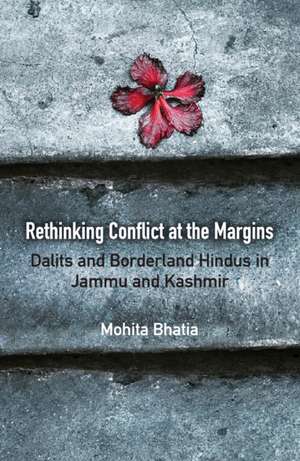Rethinking Conflict at the Margins: Dalits and Borderland Hindus in Jammu and Kashmir
Autor Mohita Bhatiaen Limba Engleză Hardback – 28 oct 2020
Preț: 578.24 lei
Preț vechi: 649.70 lei
-11% Nou
Puncte Express: 867
Preț estimativ în valută:
110.65€ • 114.15$ • 92.34£
110.65€ • 114.15$ • 92.34£
Carte disponibilă
Livrare economică 05-19 martie
Preluare comenzi: 021 569.72.76
Specificații
ISBN-13: 9781108836029
ISBN-10: 110883602X
Pagini: 222
Dimensiuni: 157 x 235 x 18 mm
Greutate: 0.41 kg
Editura: Cambridge University Press
Colecția Cambridge University Press
Locul publicării:Cambridge, United Kingdom
ISBN-10: 110883602X
Pagini: 222
Dimensiuni: 157 x 235 x 18 mm
Greutate: 0.41 kg
Editura: Cambridge University Press
Colecția Cambridge University Press
Locul publicării:Cambridge, United Kingdom
Cuprins
Preface; 1. Introduction; 2. Regional diversities and the conflict; 3. Caste, everyday life and conflict politics; 4. Border realities; 5. Contesting the homogenised discourse of religious identities; 6. Conclusion; Glossary; Bibliography; Index.
Recenzii
'This is an extremely interesting and lucid book about marginalised communities in Jammu. It draws our attention to why the axes of everyday life rests on syncretistic models, where people are predisposed to co-existence and integration. The real fulcrum of the author's analyses rests on her preoccupation with scheduled castes and how they are implicated in traditional structures of hierarchy as wage labourers or artisans. She looks at the vitality of local communities to suggest that we cannot stereotype this hierarchy, as labelling must also take into account the volatility of class relations and upward mobility. Her analyses of border peoples, and what she calls 'divided villages' rests on an emotive call to Peace with Pakistan, rather than a call to War. Her analyses of contemporary events and the politicisation of minorities is very sharply placed, as political forces work against plural ideologies and people's inherent need to live with one another. Not reducing it to compartmentalization, the author shows us that tenacity is the main spring of this heterogeneity, and the goal of justice, human rights and freedom.' Susan Visvanathan, Jawaharlal Nehru University
'A fascinating subtle analysis, from the ground up, of the socio-cultural diversity and the complex identity politics in a region of one of the world's hottest flashpoints, with its oversimplified antagonisms, 'the Kashmir conflict'.' Göran Therborn, University of Cambridge
'A crucial intervention into the study of the Kashmir conflict, this book brings to light the much-needed views of the inhabitants of the neglected region of Jammu, particularly from the perspective of caste and class. A must-read for those interested in understanding the dynamics of this disputed region.' Chitralekha Zutshi, College of William & Mary
'A fascinating subtle analysis, from the ground up, of the socio-cultural diversity and the complex identity politics in a region of one of the world's hottest flashpoints, with its oversimplified antagonisms, 'the Kashmir conflict'.' Göran Therborn, University of Cambridge
'A crucial intervention into the study of the Kashmir conflict, this book brings to light the much-needed views of the inhabitants of the neglected region of Jammu, particularly from the perspective of caste and class. A must-read for those interested in understanding the dynamics of this disputed region.' Chitralekha Zutshi, College of William & Mary
Notă biografică
Descriere
Captures the lives of those living close to the border areas of Jammu and their stories of contesting or reinforcing India-Pakistan boundaries.
